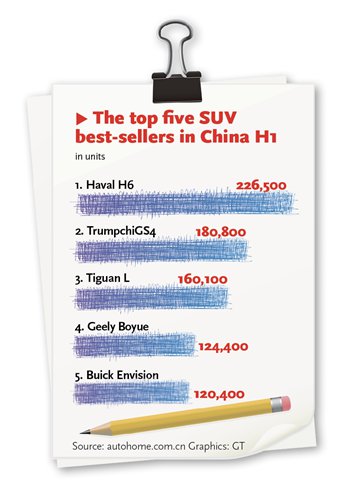
China's domestic automobile brands maintained relatively robust growth so far in 2017, though having cooled a little bit compared with last year, experts told the Global Times on Thursday, while also saying that the pressure from joint-venture car companies is getting stronger.
"Last year was an 'explosive' year for self-owned brands, with almost all brands reaping good market rewards. But this year, diversification has emerged, with some brands showing a brisk market performance with rising sales and profitability, while others slumping," Cui Dongshu, secretary-general of the China Passenger Car Association, told the Global Times on Thursday.
Some self-owned brands achieved a robust business performance in the first half of this year. For example, Geely, based in East China's Zhejiang Province, saw profits double from the 1.91 billion yuan ($297 million) it generated in the first half of 2016, according to a statement released by Geely on July 10.
Data revealed by Geely on Monday also showed that the company sold 621,731 cars in the first seven months of this year, up 89 percent year-on-year and accounting for 57 percent of its annual sales goal.
Dongfeng Xiaokang, another domestic car brand, noted in a statement on July 19 that its profits reached between 375 million yuan and 405 million yuan in the first half of 2017, about double the 196 million yuan profits it generated in the corresponding time in 2016.
Dongfeng Xiaokang sold 229,334 cars in the first seven months of 2017, up 16.94 percent on a yearly basis, according to data it released on Thursday.
But the picture was not bright for all domestic brands. BYD, for instance, saw sales slump by 15.2 percent year-on-year to 212,031, car information portal auto.cnfol.com reported on Thursday.
According to Cui, market performance of the self-owned car brands is mostly reliant upon their sales of sport utility vehicles (SUVs).
"Geely's market success in 2017 is a direct result of the fact that it launched three new SUVs last year," Cui told the Global Times. "BYD, in comparison, has not launched any new SUVs recently, and therefore its market position has cooled this year."
Data from Dongfeng Xiaokang showed that its sales of SUVs surged by almost 470 percent year-on-year in the first seven months in 2017, far surpassing its sales of other models such as cross-passenger cars.
"Chinese people have a special appetite for SUVs as they think that owning SUVs makes them feel proud in front of their friends," Cui said, adding that the status of SUVs would continue in the future.
A Shanghai-based resident surnamed Han, who already owns a BMW SUV, said she's considering buying a new car, which also must be an SUV. "SUVs' spaciousness is suitable for family use," she told the Global Times on Thursday.
Of the top 10 best-selling SUVs in China in the first half of 2017, eight were self-owned brands, with the best -seller being the Haval H6 under Great Wall, according to domestic media reports.
But Wu Shuocheng, an independent car industry analyst, said that overseas brands, which generally have been slower than domestic brands in terms of car launches, have also noted the importance of SUVs to the Chinese market and have made plans in this direction.
A number of joint venture car companies, including Dongfeng Citroen, Changan Mazda and Changan Ford, will launch new SUVs in the second half.
"If overseas brands' launch frequency of SUVs rises in the Chinese market, that would strip self-owned brands of their largest advantage," Wu told the Global Times on Thursday.
In the first half of this year, many overseas car brands, especially German and Japanese ones, also performed well in the Chinese market. For example, BMW sold 294,000 cars in China in the first six months of this year, up 18 percent year-on-year.
According to Cui, self-owned brands still performed better than overseas ones in China in the first half of 2017, but the gap became narrower.
"I think self-owned car brands should grasp the opportunity of new growth points such as electric cars in order to maintain their advantages," he said.
Wu said that domestic car brands should develop solid competence by researching technologies, instead of earning fast money just by frequently launching new models.


















































